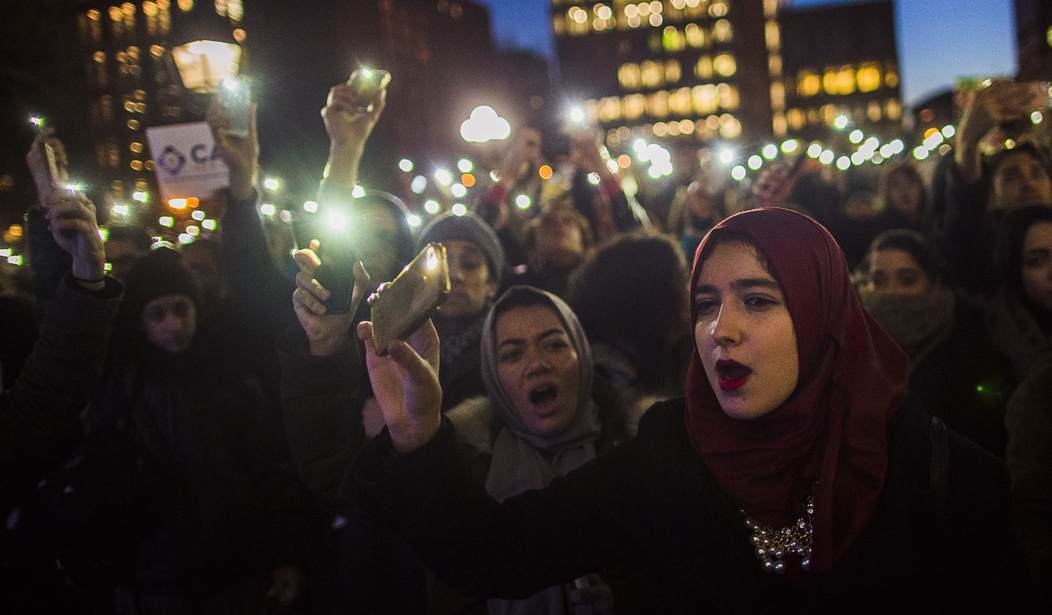WASHINGTON — President Trump said an upcoming order to suspend visas and immigration from a handful of Muslim-majority nations is “not the Muslim ban,” but “it’s countries that have tremendous terror…that people are going to come in and cause us tremendous problems.”
“Our country has enough problems without allowing people to come in who, in many cases or in some cases, are looking to do tremendous destruction,” Trump told ABC News in an interview aired Wednesday. “…You’ll be very thrilled. You’re looking at people that come in, in many cases, in some cases with evil intentions. I don’t want that. They’re ISIS. They’re coming under false pretense. I don’t want that.”
White House press secretary Sean Spicer told reporters at Wednesday’s daily briefing that Trump “has talked extensively about extreme vetting” and “you’ll see more action this week on keeping America safe.”
“As we get into that implementation of that executive order, we’ll have further details,” Spicer said. “But I think the guiding principle for the president is keeping this country safe. And allowing people who are from a country that has a propensity to do us harm, to make sure that we take the necessary steps, to ensure that the people who come to this country, especially areas that have a predisposition, if you will, or a higher degree of concern, that we take the appropriate steps to make sure that they’re coming to this country for all the right reasons.”
According to a draft of the order still subject to changes obtained by the Huffington Post, all entry of individuals from Iraq, Iran, Libya, Somalia, Sudan, Syria and Yemen would be banned for 30 days. Visas would be suspended for 60 days from countries of “particular concern” — unknown if that correlates with the U.S. Commission on International Religious Freedom list of the same name — while U.S. officials attempt to obtain security information from those countries. Interviews would be required with all visa applications.
Refugees from all countries would be blocked for 120 days while the Department of Homeland Security, the State Department and the Director of National Intelligence unanimously decide which countries’ refugees will be allowed in. Fiscal year 2017 refugees would be limited to 50,000; President Obama allowed for 110,000 refugees.
All refugees from Syria would be blocked indefinitely, according to the draft. It would establish safe zones in Syria, thereby increasing U.S. involvement there.
“We are excluding certain countries. But for other countries we’re gonna have extreme vetting. It’s going to be very hard to come in. Right now it’s very easy to come in. It’s gonna be very, very hard. I don’t want terror in this country. You look at what happened in San Bernardino. You look at what happened all over. You look at what happened in the World Trade Center. OK, I mean, take that as an example,” Trump told ABC.
In the 2015 San Bernardino attack, terrorist Syed Rizwan Farook was born in Chicago while his wife, Tashfeen Malik, was a Pakistani who immigrated from Saudi Arabia on a spousal visa.
“The world is a mess. The world is as angry as it gets. What? You think this is gonna cause a little more anger?” Trump said when asked if the order would exacerbate terrorism. “The world is an angry place.”
Former Director of National Intelligence Adm. Dennis Blair told CNN on Wednesday that “the reality is that citizens of those countries or those who have actually been in those countries face a pretty careful vetting if they apply for a visa that comes to the United States, and it takes a long time.”
“There are questions to ask. There’s proof has to be given to show that the purpose of the travel is legitimate, that those who are applying for visas don’t match up on any of our lists of people we’re trying to watch,” Blair explained of the current process. “And so we have a pretty good system right now which is based on individual screening. I think that’s far more effective.”
“…It’s not good to have a blanket travel ban from other countries. Our relationships with other countries that Americans do visit and whose citizens do visit our country for legitimate purposes should be done on an individual basis, not on some sort of ban that has no discrimination.”









Join the conversation as a VIP Member